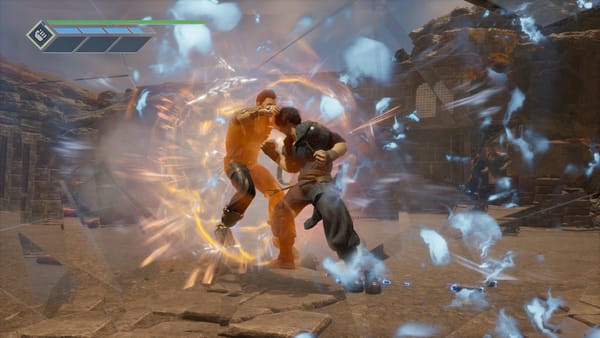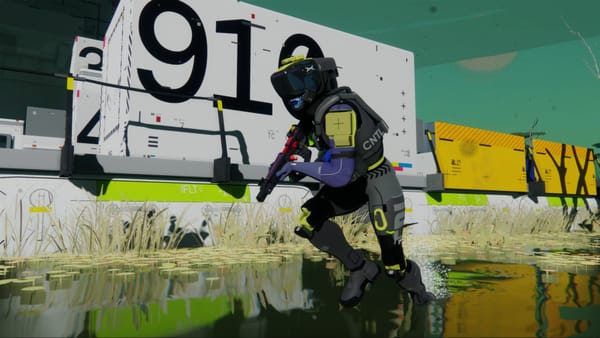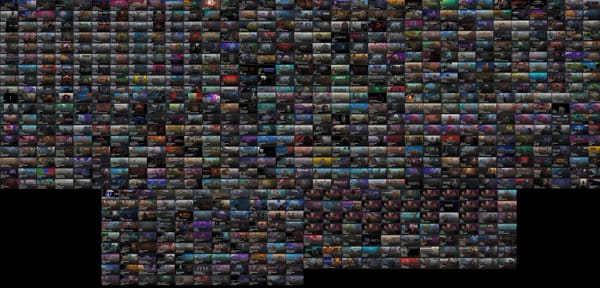#137: Dear John
With Unity stock in the gutter and somehow plummeting even further this week, how long has John Riccitiello got left as CEO?
Before we get started today, some exciting news! Tomorrow sees the return of Max HP, the not-as-frequent-as-it-should-be series of subscriber-exclusive developer profiles. I am delighted to announce that the star of tomorrow’s instalment is Jake Kazdal, CEO and creative director of Kyoto studio 17-Bit. His career has spanned over 30 years: he manned the Nintendo Hotline, worked for Tetsuya Mizuguchi on Space Channel 5 and Rez, was on Steven Spielberg’s ill-fated game project LMNO, and these days does a fine line in indie games that, while old-school in spirit, are thoroughly modern in their delivery.
Jake’s story is fantastic — borderline implausible at times, actually. He’s told elements of it elsewhere over the years, so the intent with this is to tell it as thoroughly and deeply as possible. It is the longest thing I have written in many a year. I think it’s a wonderful tale, and I’m delighted, with the support of the gorgeous and pleasantly fragrant army of Hit Points paid subscribers, to be able to give it the time and space it deserves.
Paid subs can expect it to land in their inboxes at 10am tomorrow, July 16 (I suggest putting a pot of coffee on). Free readers will get what I think is a pretty generous sample, in a bid to convince them to join the crew.
Right, that’s that. On with today’s main story.
Is John Riccitiello okay? I am starting to worry about him. Perhaps age is catching up with him, and causing him to do strange things. Maybe he has figured that, with Bobby Kotick on his way out, the industry will soon have a vacancy open for the game industry’s most widely despised asshole, and is making his pitch. Or, more likely, he sees a company falling apart around him, its stock price swirling ominously round the drain, and is doing everything he can think of to try and placate, or at least distract, his investors from the naked reality before them. Yes, probably that.
A couple of weeks ago, you may recall, the Unity CEO laid off 4% of his global workforce in a rather transparent attempt to stem the bleeding at a company whose stock price has fallen by over 70% so far this year. This week he’s tried again, with Unity announcing a merger with IronSource, a company whose technology is used in mobile apps and games for, it says here, “monetisation, marketing, analytics and discovery”, which as far as I can tell is four different ways of saying “advertising”. Though as Hit Points pal Shana pointed out in a pleasingly viral Twitter thread (congrats, Shana, on your sudden popularity; please remember us when you are famous), IronSource is better known for a malware delivery system that, among other things, got it blacklisted from Windows by Microsoft. (There’s a decent roundup of it all here.)
Seems a bit off, this, does it not. Things are hardly helped by the Unity blog post announcing the deal, which is so stuffed with jargon and buzzwords it appears to have been written by an AI which, recognising the banality of its task, has rather phoned it in. And the situation went from bad to worse when Riccitiello gave an interview to Pocket Gamer to discuss the deal, in which he says a lot of actually pretty reasonable, respectful stuff about developers who prioritise their craft before the profitability of it, and then just completely loses his mind. Behold:
“Ferrari and some of the other high-end car manufacturers still use clay and carving knives. It’s a very small portion of the gaming industry that works that way, and some of these people are my favourite people in the world to fight with — they’re the most beautiful and pure, brilliant people. They’re also some of the biggest fucking idiots.”
I am stunned by this. It comes out of nowhere! It reminds me of a five-minute taxi ride I once took in Bournemouth that began with some idle chat about the weather and ended with the driver saying, “Which just goes to show you that Hitler actually had some good ideas.” Same energy. I suppose we should expect nothing less from a man so lacking in self-awareness that he once rocked up to a keynote cosplaying as a Final Fight mid-boss, or who once allegedly propositioned a member of his executive team and, when turned down, tried to line up a threesome with two of her direct reports. Allegedly. Even on those terms, this is very strange behaviour.
Developers are predictably up in arms, not only because of IronSource’s chequered past or Riccitiello’s public questioning of their intelligence, but also because of what it says about Unity’s intended direction of travel. Last night I took the temperature of developer pals in the Hit Points Discord to see what they made of it all, and while there was a range of perspectives, none of them were good, and all were either concerned or furious about where Unity appears to be headed. Here’s one example that I thought summed it all up rather well:
“The more time and resources they spend on these sideshows — which are really not sideshows to them, they're the actual main focus — the less time they spend understanding the needs of devs in order to build better tools that actually provide value for what we're trying to do. We have to spend more and more time fighting with the Unity tools to do what we need to do, and they spend less and less time maintaining and improving them.”
I suppose we should not be surprised to see Riccitiello thinking the balance sheet is more important than the developer experience, or the player’s one, or even the optics of whatever dumb shit he has recently allowed to spill forth from his maw. It is not like this is some new pattern of behaviour from the man. Back when he was running EA, Riccitiello mused airily on an investor call about the potential of adding microtransactions to EA’s popular console games. “When you are six hours into playing Battlefield and you run out of ammo in your clip,” he said, “and we ask you for a dollar to reload… you’re really not very price-sensitive at that point in time.” Good heavens. What a mind.
So, yes, your man has form. But this is a bit different. It is one thing to steer a company like EA in an uncomfortable direction in search of some new profit line. If players don’t like it, they can just not buy EA’s games. Developers grossed out by it can choose not to work there. But Unity’s reach is enormous, spanning games of all shapes and sizes, on all kinds of platforms, and it does not make games but empower others to make their own. It is impossible for consumers to avoid it entirely, since its paid subscription tiers allow developers to remove the Unity splash screen from their games (as one wag pointed out, Riccitiello’s recent conduct may spark a surge in subscription sales from studios seeking to distance their game from the engine it runs on). And developers can’t exactly move an in-progress project from Unity to, say, Unreal by simply clicking their fingers. Even if they could, it’s not like there’s a definitively ‘better’ solution out there for them. They all have their failings; you just choose the one you know the best, or that seems best suited to what you’re trying to accomplish.
In this light, Riccitiello’s old line about Battlefield becomes even more depressing, and rather instructive. Instead of a player being “six hours deep” with an empty clip, paying for more ammo without a second thought, he sees an industry into which Unity has burrowed so deeply that it can pretty much do and say what it wants. Worse yet, he might just be right. As frustrated as developers might be by Unity’s direction — and as concerned as they may be about its future — how many of them are actually in a position to do anything about it? That’s the calculation Riccitiello appears to be making, and he doesn’t seem too concerned about being wrong.
There is a flaw in that argument, though, a wee chink in the ol’ armour. Unity’s stock price has fallen by almost a quarter this week alone, taking its cumulative slide so far in 2022 to over 76%. CEOs are rarely accountable to their customers, sure, but once you lose the confidence of your investors the writing tends to be on the wall. Hence, I suppose, Riccitiello’s current spray-and-pray approach to running his company. The problem with that tactic, of course, is that before long you run out of ammo, and in Riccitiello’s case there may not be anyone left who feels like selling him a fresh clip. Except the old boys on the taxi rank outside Bournemouth Asda, I suppose. They’ll welcome his bullshit with open arms.
MAILBAG!
Quiet one. My fault, really, for only doing one edition per week of late (sorry, sorry. Busy/lack of inspiration/too hot). Reply to this email, leave a comment, or hop into the Discord and we’ll pick this up on Tuesday.
MORE!
- Skate 4 is headed to mobile as well as console and PC, and will be free-to-play. I realise I ought to be cross about this, but my initial reaction was “Cool, I get Skate 4 for free” and actually I think it’s a fine fit, particularly since the devs have promised that monetisation will be based entirely on cosmetics, rather than content. Get some late-80s Powell-Peralta and Santa Cruz deck designs in there and I may even get my wallet out. (It’s also very well-suited to Fortnite-y crossover collabs with real-world clothing companies, but let’s not go giving them too many ideas.)
- The Russian government is reportedly considering investing “billions of Rubles” (£1.40) into the development of a Russian game engine, in response to economic sanctions which have made western solutions such as Unreal Engine unavailable in the country. Mad stuff, this. One assumes that anything that gets made with it wouldn’t be released anywhere else while sanctions are in place, but I suppose that’s better than nothing if you’re a Russian game developer.
- Tony Hawk has announced “the biggest skate park in the metaverse”, after The Sandbox’s cheque cleared. Ugh.
- Nintendo has acquired animation studio Dynamo Pictures, renaming it Nintendo Pictures as it continues its sure-to-be-successful foray into movies and TV.
- The PC market contracted by 12.6% in the second quarter of 2022, according to market research bods Gartner. It is the biggest decline the sector has seen in nine years.
- Spotify has acquired music-themed Wordle variant Heardle, which is annoying for those of us who have recently moved over to Apple Music. I like doing the 90s one, because a) I am ancient and b) best decade.
- Elden Ring is one of the top ten best-selling games of all time in the US. Bloody hell.
All done! I will now hurriedly put many thousands of words of Max HP into the Hit Points backend and hope nothing breaks. Have an excellent weekend, won’t you, and I’ll see you on the other side.





